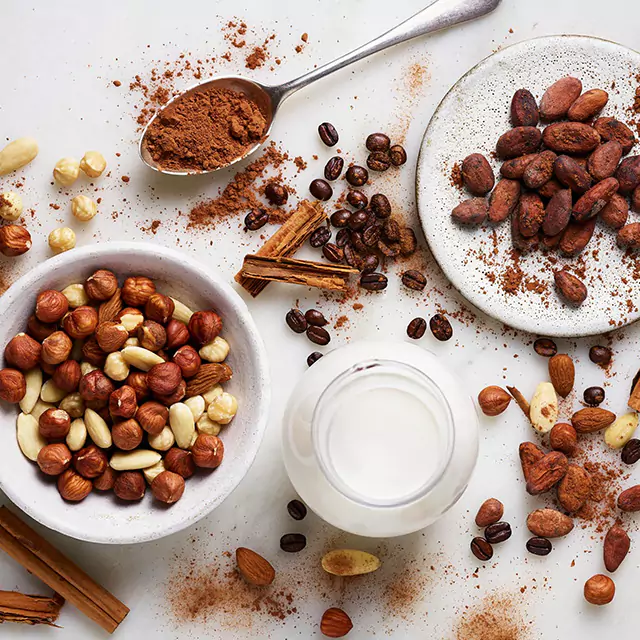Shekhar was appointed CEO of ofi in January 2020 upon its creation following the reorganization of the Olam Group. Shekhar joined Olam in 1992 and has been an Executive Director and a member of the Group Board since 1998. Shekhar held a variety of roles in the Olam Group, he was previously Group Chief Operating Officer, Executive Director – Finance and Business Development, and prior to this he incubated and managed various global businesses including the Nuts, Spices and Packaged Foods businesses, where he led many of the Company’s organic and inorganic growth initiatives.
Rishi was appointed CFO of ofi in January 2020 upon its creation following the reorganization of the Olam Group. Rishi began his career with Olam in 2000 and during this period has served as CFO India, CFO West Africa, and President and Global Head of Corporate Finance. He is a founding member of the first Circle of Practice in Asia of The Prince of Wales Charitable Project, Accounting for Sustainability (A4S). A4S inspires action by finance leaders to drive a fundamental shift towards resilient business models and a sustainable economy.
Ashok is a management graduate with almost 30 years’ experience. He has been with Olam since 1992 and is the Global Head of the nuts business which includes almonds, cashew, hazelnuts, peanuts, pistachios and walnuts. He is also Chairman of the Executive Human Resource and Compensation Committee.
Prakash joined Olam in 1998, taking responsibility for coffee operations in Uganda. He moved into the risk function in 2001 and relocated to Vietnam in 2007 to take on the role of Country Head, extending to a regional role in 2010.
Since 2016, he has been responsible for Olam’s Southeast Asia and China operations, which he continues to manage today. His key markets include China, Indonesia, Vietnam, Papua New Guinea and Thailand.
Prakash is a Graduate of Commerce and holds an MBA from the Indian Institute of Management. He was recently awarded the prestigious Young Alumni Achiever Award by his alma mater for Corporate Leadership.
Having joined Olam in 1998, Sandeep has expertise across all five ofi product platforms. He became CEO of ofi’s Dairy business in 2017, also taking on the role of Global Head of Sales in 2020. As CCO, Sandeep has responsibility for driving sales excellence and customer centricity with more focussed key account management processes. In leading the ofi F&B Solutions platform, Sandeep oversees global strategy execution for the platform enabling it to become a growth driver for the business. He also continues to oversee the Dairy business globally.
Sandeep is a Graduate of Commerce and holds an MBA from the Indian Institute of Foreign Trade.
Teji joined Olam in 1997 and went on to manage ofi’s cocoa business in Togo, Benin, Côte d’Ivoire and Singapore. He moved to London in 2009 to manage the company’s global cocoa beans and products business, returning to Singapore in 2019.
He was integral in the integration process following the acquisition of ADM Cocoa in 2015. He is an expert in cocoa trading and origination, and previously served on the Board of Cocoa Association of Asia.
Ian joined ofi in January 2022, taking responsibility for the global legal, compliance and company secretarial teams.
Ian has over 30 years of experience working in both private practice and global FTSE listed companies across a diverse range of sectors including food, media and distribution. He has significant commercial, M&A and management experience with previous roles including executive management responsibility for HR, information security, indirect procurement and risk at a global level.
Kamesh joined Olam in 2010 and held various senior manufacturing, innovation and quality roles. In 2020 he became Chief Innovation & Quality Officer at ofi, overseeing a global network of Innovation centers and driving quality and food safety across 100+ food ingredient manufacturing plants.
Kamesh holds a Master’s degree in Food Science from the Pennsylvania State University and a Master’s degree in Business Administration from the State University of New York.
Dan joined ofi in January of 2022, bringing with him 35 years of FMCG food industry experience. His industry experience includes many iconically branded food companies, several private label manufacturing entities as well as multiple private equity portfolio companies. Specializing in end to end operations and supply chain disciplines, Dan’s focus is delivering the ‘one-ofi’ business for all stakeholders across a balanced scorecard of performance. As the global, functional lead for operations, Dan is responsible for aligning and realizing successful, holistic results for ofi across more that 115+ facilities around the globe.
Sathyamurthy (Satya) joined Olam in 1996 to manage Sesame and Cashew operations in Nigeria, before moving on to lead Cocoa and Cashew operations. He moved to Cameroon as Country Head in 2001 before taking the role of Country Head – Nigeria & Benin in 2004. He then established the business across South America in 2007. In 2020 he began his current role at ofi as Regional Head for Latam and head of Cocoa Americas
Satya has over 30 years of international industry experience. He is an agricultural Engineering Graduate from CAE, TNAU (India) and holds an MBA from IRMA.
Yusuke joined Olam in 2016 and has worked across a wide range of initiatives, including corporate strategy, re-organization & re-structuring, operational excellence and customer excellence.
He has been in the food & beverage industry for over 15 years and has held various positions within the sector from supply chain & procurement, international sales & marketing, to business development and M&A.
Yusuke holds an MBA from New York University Stern School of Business.
Usha joined ofi in September 2022, taking responsibility for driving the company’s one-ofi strategy and amplifying its unique entrepreneurial culture leading global diversity, inclusion and equity, organization effectiveness and global talent management.
With over 25 years of professional experience across a diverse set of industries and iconic brands, she has expertise across finance, sales, marketing, project management and strategy. Usha has worked across all areas of HR – leading HR strategy, talent management, organization transformation, leadership development and succession.
Steve joined ofi in September 2022, taking responsibility for expanding ofi’s leadership position on sustainability by digitizing traceability, supply chain delivery, and social impact transparency.
Steve has over 30 years of experience, which includes working at blue chip global listed companies across a diverse range of sectors including distribution, consumer goods and food ingredients. He holds significant experience in Information Technology (IT) management and leading large-scale digital transformational initiatives.
Roel joined Olam in 2013 as the global commercial lead for its spices business. He then moved internally to lead the award-winning sustainability insights management system AtSource. Most recently, Roel was seconded as a co-founder of the wider industry led sustainability measurement digital platform TRACT. In 2024 he became Chief Sustainability Officer at ofi, with responsibility for scaling ofi’s ability to drive positive impact across its five leading product platforms.
With over 25 years of industry experience, spanning senior leadership roles across the food and agriculture sector, he has extensive expertise across both food ingredients and sustainability, along with having held several board positions – including as Vice Chair of The Sustainable Spices Initiative.
Roel holds an MSc from Wageningen University in environmental sciences.
Read ofi news
By Andrew Brooks, Head of Cocoa Sustainability, olam food ingredients (ofi)
This week, the world’s attention turns to a heavy burden that can damage a child’s Health and Education: child labour. In ofi's cocoa business, we are focused on solving this problem every day.
Most child labour in cocoa relates to children carrying out hazardous tasks on the family farm, distinct from the much rarer issue of forced labour, and has no one cause. Labour laws can be misunderstood, and schools might be located far away. Even if there is a school nearby, children may not have the documents they need to enrol. When combined with rural poverty, many parents think their child’s time is best spent helping on the farm. And now, these cocoa-growing communities are also battling a global health pandemic.
We’re working to tackle each of these challenges in turn. Under our Cocoa Compass sustainability ambition, we aim to completely eradicate child labour from our direct supply chain by 2030 and ensure farmers’ children can access the education they are entitled to. In 2020, we reached the critical milestone of rolling out child labour monitoring across 183,000 households in nine countries.
There is still a lot to do, and collaboration with our customers, national governments, and civil society is essential. For example, we recently asked the Fair Labor Association (FLA) to assess the extent to which cocoa farmers and their families have benefited from our sustainability programmes in Côte d’Ivoire, their perception and satisfaction with these interventions, and help to refine our approach further.
Using a due diligence methodology called Social Impact Assessment, the FLA collected extensive data and interviewed over 450 people from ten cocoa communities, including women and children. It found that of all our efforts to tackle child labour, the setting up of child labour monitoring and remediation and enabling access to education are the most advanced and have the most significant impact.
It also revealed that over two-thirds of those interviewed think child labour is on the decline in their community, and 80% believe that the interventions by ofi and our partners are contributing to protecting children.
There are areas for improvement. The FLA suggested we provide additional support to help farmers access affordable labour. And ensure greater follow-up with Village Savings and Loans Associations to maximise their ability to promote child protection.
We know that combining our efforts through multi-stakeholder partnerships, championed by local and regional governments, and supported by international finance institutions, is the best way to create the kind of long-term systemic change needed to reach universal school attendance
and graduation for children in cocoa communities.
This World Day Against Child Labour reminds us that if we want to put children first in cocoa, we must be open to testing new approaches and adapting our efforts based on what works best. The future of a cocoa generation is at stake if we don’t.







